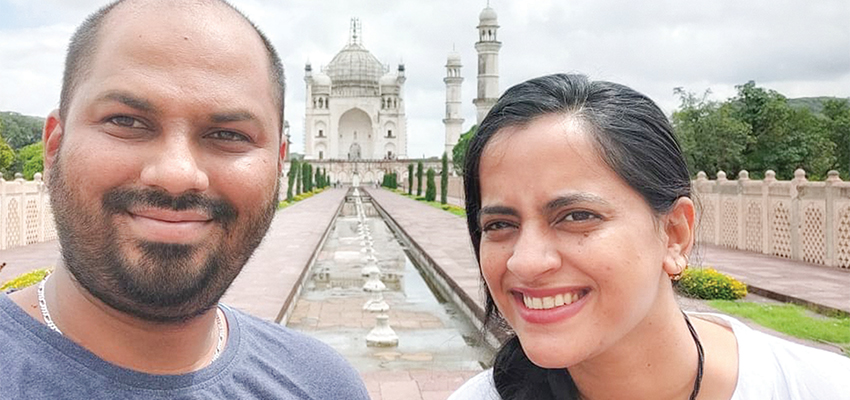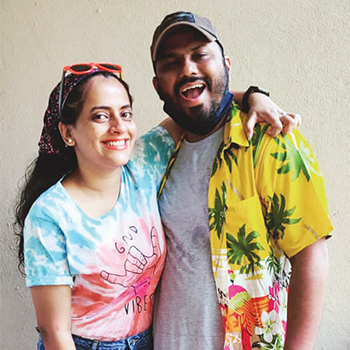Togetherness takes two

Anuradda Banerjii and Prasad Kulkarni believe that marriage is about celebrating differences and making the most of each moment. She’s a Bengali, he a Maharashtrian, together they march to a tune they have composed and harmonised over six years of marriage
Come the Ganesh festival every year, and Anuradda Banerjii goes all out to ensure things are just so. From the murti to the prasad to the timings of the aartis, not to mention the perfect meal for Gauri pujan.
Sometime later when it’s Durga pujo, her husband, Prasad Kulkarni, looks forward to the fun of pandal hopping, and the perfect dish of fish.
And to think, cultural differences are said to be an obstacle to togetherness. But, Anuradda and Prasad believe their lives are the richer for it.
Back to the beginning
This love story was scripted on the campus of Fergusson College, Pune, where Prasad Kulkarni, Bachelor of Science (B.Sc) graduate, in physics and photography programme, was teaching his juniors. That’s how he and Anuradda first met.
“The course that we both studied was the only one of its kind in India—unique and interesting. So, of course, there was a lot to talk about. I had several questions, and that’s how it all started,” shares Anuradda. “What’s more, I loved his work. He has a way of effortlessly getting the most amazing and unusual shots, and that’s something to be admired a great deal,” she adds.
Their personalities kept the conversation going. “I am a patient listener, whereas he is expressive. Our value systems are similar though. The relationship grew stronger by the day,” she says.
From the outset, she admired him for his adaptability and ability to navigate a crisis with a cool head. “He’s faced a lot of challenges from his childhood, and he has a way of overcoming the situation, no matter how hard,” says Anuradda. On his part, Prasad admires how sorted and practical she is. “Personally, I tend to take time to come to a decision. But she comes up with amazing, workable solutions just like that,” he says.
Given the strength of their friendship and comfort with each other, it was time to take things ahead. After all, they had known each other for a long time. Getting married was a logical progression of events, but as in the case of inter-cultural relationships, there was a sense of hesitation. “No one in my family had married outside. But my elder sisters (his parents are no more) and mama, mami (his guardians) were ok with it,” reminisces Prasad.
Meanwhile, Anuradda’s father had his reservations about a young man starting his own business as opposed to the security of a stable job. But eventually, he gave them his blessing. The duo was wed in 2018 after eight years of courtship.
From strength to strength
As of now, Anuradda is employed with Fulcrum Digital, leading up the global media & communications mandate, while Prasad has his own media production company, Ignited Spectrum, which specialises in audio-visual production. Life is hectic but rewarding. So how difficult is to adjust in an inter-cultural marriage anyway? “It’s a mix of a lot of things,” says Anuradda thoughtfully. “You have to meet people half-way, be open to newer experiences and above all, be accepting,” she says. “My sisters-in-law have been very helpful and have shown me the basics of getting the Maharashtrian cooking, cultural nuances and the rituals correct,” she adds.
From being a protected daughter and pampered sister to running a home, planning, cooking and learning the nuances of one another community’s ways was challenging, but also an opportunity for growth. She adds, “It’s been quite the learning curve, but worth it. At the end of the day, adjustment boils down to open communication.”
Quality time together for this mid-thirties couple consists of long road trips by car to different cities, be it Goa, Hyderabad, Konkan, Gujarat or Bengaluru. “That’s where we really get a chance to talk to each other. It’s time we cherish together,” says Prasad. “The best part about these trips is that they tend to be spur of the moment and so much fun.”
"Honestly, each relationship evolves over time. That initial heady attraction you feel towards each other may change with time but being able to talk easily to each other is always a bonus"
-Anuradda Banerjii

Ardent foodies both, they recount a memorable trip to a city known as a food-lover’s paradise, namely Indore. “There is a food gully called Chhappan Bhog with over 56 stalls of mouth-watering sweets, savouries and snacks. We really enjoyed that experience,” he says.
Given the amount of time they have spent together, what according to both, are the pillars of a marriage? “I would say friendship first. For that’s how we started out: as friends. Whenever we take a decision, we don’t feel the pressure of being spouses. We are just buddies at the end of the day,” says Prasad.
Add respect and companionship to the mix, and the result is a strong, healthy bond. “Honestly, each relationship evolves over time. That initial heady attraction you feel towards each other may change with time but being able to talk easily to each other is always a bonus,” says Anuradda.
Like every couple, they have their share of fights. So how do they resolve differences? “We give each other time. It’s not necessary to sort out things or have immediate answers to questions,” says Anuradda. While Prasad adds with a grin, “I can’t stand the silence for too long, so I break the ice with a funny or sarcastic comment.”
Both have accepted the difference in each other’s preferred mode of communication. “I tend to send long text messages, whereas he prefers face-to-face conversations,” says Anuradda.
It’s all about family
Eventually, both wish to start their own family and balance home, work and children. “We both believe that family is essential to progressing in life and at work. Flying solo may work for some, but we think that family is a great support system. People who are there for you to encourage you and clap for you, make your struggles worthwhile,” rounds off Prasad.
THE MANTRAS OF MARRIAGE
- Friendship
- Mutual affection and respect
- Communication
- Respecting differences